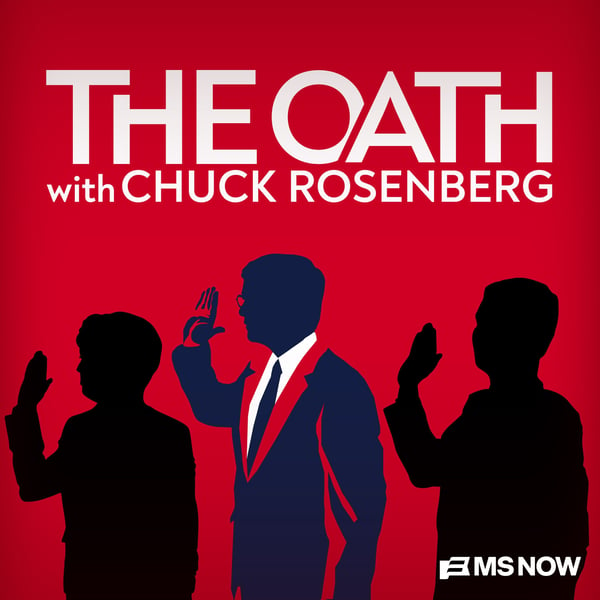Robert S. Mueller III: The Director (Part 2)
The Oath with Chuck Rosenberg
MS NOW, Chuck Rosenberg
4.8 • 15.8K Ratings
🗓️ 3 February 2021
⏱️ 55 minutes
🧾️ Download transcript
Summary
Transcript
Click on a timestamp to play from that location
| 0:00.0 | I do solemnly swear that I will support and defend the Constitution of the United States against all enemies, foreign and domestic. |
| 0:11.0 | But I will bear true faith and allegiance to the sea that I take this obligation freely. |
| 0:15.5 | Without any mental reservation or purpose of evasion, and that I will well and faithfully discharge the duties of the office on which I am about to enter. |
| 0:24.5 | So help me God, so help me God. |
| 0:26.5 | So help me God. |
| 0:31.5 | Welcome to the oath. I'm Chuck Rosenberg and I am honored to be your host for another compelling conversation with a fascinating guest from the World of Public Service. |
| 0:40.5 | This episode marks our season four finale, and as promised, I am honored to share with you the second part of my conversation with Bob Mueller, the former director of the Federal Bureau of Investigation. |
| 0:54.5 | As I noted in the introduction to part one of my conversation with Bob, at the beginning of this season, Bob is a man of few words. |
| 1:02.5 | That's still true, and so each word matters a lot. |
| 1:06.5 | When he speaks, which is not often, it is definitely worth listening. |
| 1:11.5 | Again, my interview with Bob Mueller is the only one he has given since leaving public life, and it may be the only one that he gives. |
| 1:19.5 | In part one, Bob discussed his upbringing, his schooling, and his service in the Marine Corps, something for which he volunteered following the death of a Princeton classmate in Vietnam. |
| 1:30.5 | That service included Marine Corps officer basic school, Army Ranger school, and jump school, after which Bob was deployed to Vietnam, where he led a rifle platoon along the Demilitarized Zone. |
| 1:42.5 | A recipient of the bronze star with valor, and the purple heart, Bob returned to the United States after his service in Vietnam, and began a career in the Justice Department that took him to the Heights of Federal law enforcement, and to the helm of the FBI. |
| 1:57.5 | Part two of my interview with Bob begins as he becomes the sixth director of the FBI, just a few days before the devastating attacks of 9-11. |
| 2:07.5 | A meeting with President George W. Bush in the White House on the morning of September 12th dramatically changed Bob's assessment of what the FBI needed to do to prevent another attack, and it led to an extensive restructuring of the FBI, one that was not immediately embraced in all corners of the organization. |
| 2:27.5 | Bob navigated difficult challenges as he led a post-9-11 FBI, including an effort that he opposed to split the FBI into two agencies along the lines of Britain's MI5 and MI6. |
| 2:40.5 | He also forbid FBI special agents from conducting interrogations of terrorist subjects that did not adhere to well-established constitutional rules and procedures, a decision that was not particularly popular within parts of the FBI at the time. |
| 2:56.5 | But that turned out to be wise and prescient. |
| 2:59.5 | It is fascinating to see the FBI through the eyes of the man who served for 12 years as its director, the second longest tenure in history, and the only person to be nominated as FBI director by two presidents, George W. Bush and Barack Obama. |
| 3:16.5 | As before, I should mention what is not in this episode, any substantive discussion of Bob's work as special counsel, leading the investigation into Russian interference in the 2016 election. |
| 3:29.5 | Bob was abundantly clear when he testified before Congress about that work, and his report, and that the report spoke for itself. |
... |
Please login to see the full transcript.
Disclaimer: The podcast and artwork embedded on this page are from MS NOW, Chuck Rosenberg, and are the property of its owner and not affiliated with or endorsed by Tapesearch.
Generated transcripts are the property of MS NOW, Chuck Rosenberg and are distributed freely under the Fair Use doctrine. Transcripts generated by Tapesearch are not guaranteed to be accurate.
Copyright © Tapesearch 2025.

